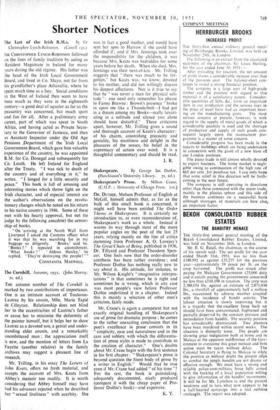THE autumn , number of The Cornhill is
marked by two contributions of importance. One is an intimate account of Toulouse- Lautrec by his cousin, Mlle. Marie Tapie de Celeyran. Relationship does not blind her to the eccentricities of Lautrec's father or cause her to minimise the deformity of the painter himself, but it helps her to show Lautrec as a devoted son, a genial and under- standing elder cousin, and a remarkably unembittered man ; the appreciation itself is new, and the mention of letters from La Fayette (another relative) in the family archives may suggest 'a pleasant line of research.
Mr. Trilling, in his essay The Letters of John Keats, offers no fresh material, and accepts the account of Mrs. Keats from
Abbey's memoir too readily. It is worth considering that Abbey himself may have had his advances rejected when he described her "sexual liveliness" with acerbity. She
was in fact a good mother, and would have sent her sons to Harrow if she could have afforded ii`; and if Mrs. Jennings took over the responsibility for the children, it was because Mrs. Keats was bedridden for some years before her death. When she died, Mrs. Jennings was their next-of-kin. Mr. Trilling suggests that " there was much to be for- gotten," but Keats was, we know, devoted to his mother, and did not willingly discuss his deepest affections. Nor is it true to say that he " was never a man for physical soli- tude ": one need only remember his phrase to Fanny Brawne : Brown's presence " broke in upon me like a Thunderbolt—I had got in a dread.' among my Books—really luxuri- ating in a solitude and silence you alone should have disturb'd." These criticisms apart, however, Mr. Trilling gives a sound and thorough account of Keats's character: of his charm, astonishing precocity and geniality, his manliness and delight in the pleasures of the senses, his belief in the supremacy of action over word. It is a thoughtful commentary and should be read.
J. R.


































 Previous page
Previous page